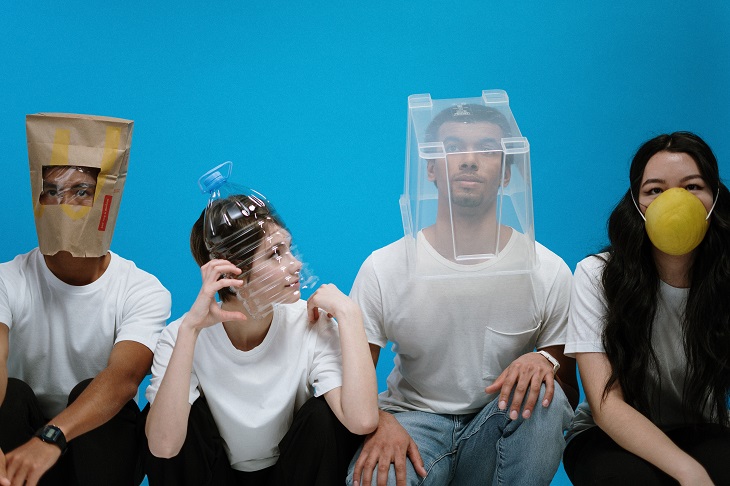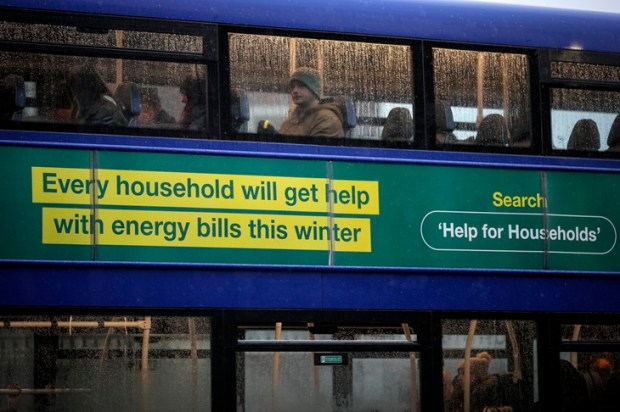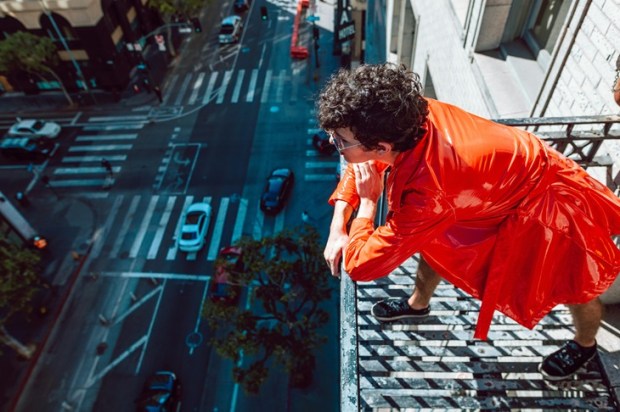Shortly after the World Health Organisation declared a ‘public health emergency of international concern’ in January 2020, many Australians hid from Covid indoors. Unwilling to do the same, I caught a train to visit a friend who was also struggling with the isolation.
To be honest, this small act of dissidence was thrilling and set the tone of my life for the next three years. I was not concerned about catching any viruses, only about the transformation of society I seemed to be living through.
While waiting for the train I heard, for the first time, a voice from the loudspeakers insisting that I wear a mask, cover my mouth if I should happen to cough or sneeze, keep my distance from others and sanitise my hands. There was a sense of unreality about it. As cliché as it sounds, I felt I had stepped into a dystopian reality. I did not feel like I was living through what would the WHO would soon declare a pandemic, but through a shift in the relationship between governments and citizens across the world that would lead to greater governmental control over our lives.
As the months progressed, I saw no reason to believe that Covid was deadlier than the regular flu. It seemed that vital pieces of information, such as the case fatality rate, the average age of Covid fatalities, and the fact that the true number of ‘cases’ must have been higher than reported given the people not getting tested, were being omitted or downplayed to incite maximum panic. I was unconvinced by the propaganda footage of people collapsing in China and the alarmist rhetoric about Italy, as even in those first months of 2020 it was apparent, if one looked carefully, that only the elderly and already immunocompromised were seriously at risk.
Nor did I accept that masks would prevent infection (why would they?). All I saw was fearmongering from the mainstream media, which I have never trusted. At best, this was a panicked overreaction of governments and exploitation by the media. At worst, the Covid narrative was a lie being used to control citizens.
Several months after my gloomy reflection at the railway station, the Black Lives Matter protests, named after the well-funded Marxist organisation, caused concerns about Covid to vanish in Democrat-led American cities. Somehow, the powers that be convinced Americans that leaving one’s home was endangering others, but looting in the streets was justified, as the virus apparently ceased its lethal activity in the name of social justice, but remained lethal at church services and Trump rallies. A Black Lives Matter rally was then held in Victoria in June 2020, despite the stay-at-home orders being enforced by the Victorian state government at the time.
I already doubted the Covid narrative, but the allowance of this protest entrenched my distrust. If people were going to protest ‘racism’, or tolerate others doing so, then they weren’t concerned about Covid. Their enthusiasm for lockdowns and mask mandates was motivated by something else.
When that protest occurred, churches, schools, and workplaces had recently been closed across Australia. The second Melbourne lockdown began shortly after the protest. Weddings and funerals were severely restricted and loved ones died alone in hospital beds, yet a massive protest, sparked by an incident in another country, was permitted to decry ‘racism’. The obvious hypocrisy angered me, as did the weakness of politicians and church leaders unwilling to call it out who had applauded everyone for staying at home to ‘keep everyone safe’.
My scepticism of the pandemic and systemic racism narratives rendered me an undesirable person in a politically correct society. Conversations with others became tense, and I was not enjoying the new dystopia of 2020. I wanted to attend church and my university lectures in person, not on Zoom. I wanted to work, not stay at home all day. Excepting the alarmist rhetoric of the media, I saw no reason why I should not be able to do these things. While I lamented the emergence of a medical dictatorship and what appeared to be a Marxist revolution taking place in America, others were undisturbed by these events, and while many people experienced hardship, others enjoyed the novelty of 2020.
The senses of excitement (there’s a virus out there that might kill me) and solidarity (we’re all in this together) that the pandemic hype induced gave people a warped sense of purpose. This was supposedly the great battle of our time, and we all needed to work together, meaning anyone who dissented was, at best, stupid or, at worst, dangerous. Complying with the nonsensical and arbitrary rules was promoted as selfless, while those who expressed concern about government overreach or confusion regarding the rules (you must wear your mask when standing up, but can take it off when sitting down), were consistently deemed dangerous, selfish, and stupid over the next few years, especially after the vaccine mandates began.
Some people became controlled by anxiety about catching and spreading the virus and were upset with people who refused to wear masks. I recall walking maskless into a cinema complex in a shopping centre, a wide-open space, where a woman began waving her arms in the air shouting, ‘Mask! Mask!’ as she approached me (one wonders why she did so if she was afraid of Covid). Others enjoyed the power trip afforded by becoming the government’s Covid enforcers. Many people simply did what they felt they had to do, whether that was wearing a mask, refusing service to a non-compliant customer, or, later, getting their jabs. They didn’t enjoy it, but they felt they had no choice. The social and economic consequences of non-compliance were severe.
Some of us drew a line in the sand early on. I was not going to wear a mask or get tested, and when the ‘rollout’ began, I was not going to get the jab. I was concerned about the novel technology these provisionally approved products utilised and the lack of safety data but, more importantly, it was my own decision, and I was not going to be told what to do. By late 2021, I had no idea when I was going to be able to leave my home state again, or what career options would be open to me in the future given the stance I had taken.
However, as time has passed, I have had the strange experience of witnessing the Covid narrative slowly align with my intuition, and of seeing others come to believe what l believed early on.
For example, I knew that lockdowns would cause more harm than good, something that was reviled as a dangerous conspiracy theory in 2020 and 2021, but this is now almost universally acknowledged. One recent preprint research paper assessing the global impact of lockdowns by an academic from the University of Washington reads:
‘Many original predictions are broadly supported by the research data including: a rise in non-Covid excess mortality, mental health deterioration, child abuse, and domestic violence, widening global inequality, food insecurity, lost educational opportunities, unhealthy lifestyle behaviours, social polarisation, soaring debt, democratic backsliding, and declining human rights. Young people, individuals and countries with lower socioeconomic status, women and those with pre-existing vulnerabilities were hit hardest… it is likely that many Covid policies caused more harm than benefit…’
This is precisely what the ‘anti-vaxxers’ were saying in early 2020. One didn’t need an academic paper to predict this, yet I’m sure people will now quote such articles as though this was unknowable in 2020, washing their hands of the fact they said nothing at the time.
I knew that the mortality rates of Covid were meagre. According to the government’s Covid data, the current case fatality rates sits at 0.18 per cent, and that means deaths with, not of, the virus. Most of these deaths fall into the 60+ age bracket (one wonders how many belong in the 80+ bracket, but the Department of Health’s website say). It’s almost as though Covid is just the regular flu. The Department of Health’s reporting also informs us that, ‘The current case fatality rate is likely overestimated due to changes in case ascertainment and under-reporting of non-severe cases.’
I knew that masks would turn out to be ineffective in preventing transmission. After all, The Sydney Morning Herald told us as much regarding the SARS virus twenty years ago. Various studies have demonstrated this point but, again, studies were not needed to reach this conclusion. All one ever needed to know is that air passes through standard cloth masks, meaning any flu-like virus also can.
Now, apparently, garlic is all that is required to destroy Covid. This makes sense, as garlic helps immune function. One has to admire the hubris of the powers that be, given this claim was ‘fact-checked’ in 2020. This is yet another example of the controlled shifting of the narrative, whereby the media, governments, and the medical/scientific establishment gradually admit that the anti-vaxxers were right, without apologising, and in a way that is designed to reassure those who believed the propaganda that they behaved reasonably because the evidence is based on ‘new research’. Yes, I know that the ABC reported that this is a very specific variety of garlic, but surely any thinking person can see that the hysteria regarding Covid was, to say the least, exaggerated, as was the treatment of those who declined the provisionally approved injections.
There were touchstones along the way that provided an intellectual foundation for those who knew, in principle, that the Covid restrictions were immoral and irrational, and therefore unjustifiable, such as the presence of eminent scientific and medical professionals, such as Dr. Robert Malone and Dr. Peter McCullough, who challenged the incoherent public health narrative. There were the ways that the predictions of Dr. Fauci (‘When you get vaccinated … you become a dead end to the virus’) and Joe Biden were blatantly contradicted. The momentum that the Freedom Movement gained in Australia and Canada was encouraging, and the energy at the freedom rallies was electric. There was a sense of people from many different walks of life coming together to oppose injustice and corruption. People who held the line can look back over the past few years and know that they are not easily breakable.
However, escaping brokenness requires forgiveness. It will do nobody any good to allow the pandemic experience to make them bitter and resentful. We must engage in the restoration and preservation of our liberties in a considered, gracious, and determined manner, and be willing to show kindness where we were mistreated, being grateful that there has been a raising of consciousness regarding the powers that be.
As strange as it seems, I am grateful for the Covid experience. I and many others trusted our instincts, and they turned out to be correct. I’ve learned a lot about how people behave under pressure, and how many will comply with the most arbitrary, cruel, and nonsensical rules if they believe they will suffer consequences for not doing so. That pressure feels like a dream now, as the grim reality gets quietly ‘memory holed,’ to use Orwell’s phrase, but it was palpable for a time. Many, if not most, unvaccinated people were made to feel they would be shut out of society if they refused to comply, yet they persevered.
For most people, the enthusiasm for the Covid narrative has waned. One still sees the occasional mask-wearer at the shopping centre, and mandates are still in place in certain settings, but the emergent dystopia I dreaded while waiting for a train in early 2020 has mostly subsided, despite the intensity that was reached. These days, people are hesitant to tout the importance getting vaccinated to protect one’s neighbour, and awareness of the adverse events induced by the injections is growing. The narrative is indefensible. I am ready to move on from the experience.
But I will never forget it.
Got something to add? Join the discussion and comment below.
Get 10 issues for just $10
Subscribe to The Spectator Australia today for the next 10 magazine issues, plus full online access, for just $10.


























Comments
Don't miss out
Join the conversation with other Spectator Australia readers. Subscribe to leave a comment.
SUBSCRIBEAlready a subscriber? Log in